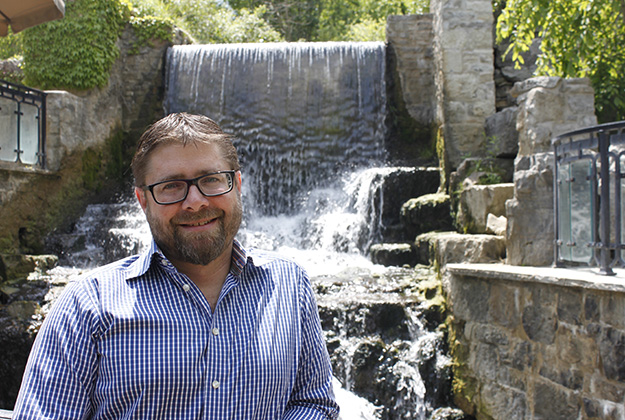McMaster engineer receives nearly $2 million for energy conservation research

'Besides large transmission losses when electricity is transported, we aren’t efficient in capturing the bi-products of energy production,' says Jim Cotton, a professor in the Department of Mechanical Engineering. 'As much as 70 per cent of potential energy is wasted.'
McMaster researcher Jim Cotton has received $1.9 million from the Canada Foundation for Innovation (CFI) to investigate new ways to capture the energy supply which is lost during transport to our homes and communities.
A vast and complex network of corridors is currently used across the country to move electricity, natural gas and oil, or to transport coal and propane by rail, ship or highway.
Traditional delivery systems have many disadvantages, says Cotton, a professor in the Department of Mechanical Engineering at McMaster.
“Besides large transmission losses when electricity is transported, we aren’t efficient in capturing the bi-products of energy production – as much as 70 per cent of potential energy is wasted. When you factor in the impact on the environment, the lack of sustainability and our vulnerability to power loss due to weather, it’s clear we need to improve how we use our energy resources.”
The solution? Break down what Cotton describes as our current “siloed” energy practice by creating facilities that will harvest electrical, thermal and fuel energy where it naturally converges — in buildings.
Cotton and a team of 16 energy experts will establish the Research Facility for Integrated Building Energy Harvesting Systems (ReFIBES), the only test facility of its kind in North America.
ReFIBES will be designed and fully incorporated into the Gerald Hatch Centre for Engineering Experiential Learning. The facility will bring together engineers, scientists and students who will research integrated energy systems for urban use.
The project will focus on community energy management, integrated sustainable energy systems and energy harvesting and storage.
These three thematic areas will look at human, weather and environmental factors, while integrating renewable energy such as wind and solar, and the harvesting and storing technologies required to capture and repurpose thermal energy.
“We’re building on McMaster’s strengths and expertise in energy systems research to provide game-changing improvements to energy resource utilization,” says Mo Elbestawi, vice-president, Research & International Affairs. “The Research Facility for Integrated Building Energy Harvesting Systems will lead the way in providing energy solutions that will meet the diverse needs of Canadians, using approaches that are resilient, as well as economically and environmentally sustainable.”
“The Research Facility for Integrated Building Energy Harvesting Systems will lead the way in providing energy solutions that will meet the diverse needs of Canadians, using approaches that are both economically and environmentally sustainable.”
McMaster University is one of 52 research institutions to receive funding through the CFI’s Innovation Fund, announced today in Ottawa by Ed Holder, Minister of State (Science and Technology).

